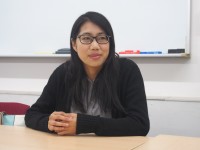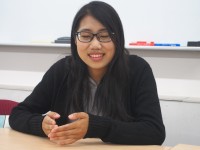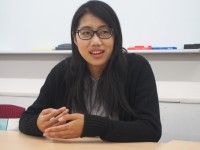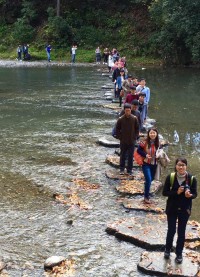- News
- Student Voice: YU Lina
Student Voice: YU Lina
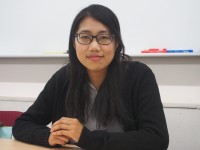
- Posted
- Wed, 03 Feb 2016
From People’s Republic of China
- Name
YU Lina - Country/ Region of Citizenship
People’s Republic of China - Graduated from
Peking University - Department
Department of Architecture (Doctoral)
CSC Scholarship honored
How did you find out about Waseda University?
Waseda University is very famous in China. Peking University, where I used to study, has a partner relationship with Waseda University. Many Japanese students from Waseda study at Peking University for exchange. I met several Waseda students when I was in China and I got information from them. Also, I got in touch with a SENPAI (senior student) in my current lab who was also from Peking University and he offered me a lot of information about the lab and Waseda University.
Why did you choose Waseda University?
I think we chose each other. I chose Waseda and Waseda University and my supervisor chose me. As I said before, Waseda University is very famous in China. In the campus of Peking University, there are many Sakura trees named after Waseda University.
I got interested because researches in my current lab are very close to my research interest. I think my lab does researches on what we cannot learn at any other place so it was the perfect choice for me.
How did you get information for our program?
I got information on Waseda mostly from my Senpai (senior students) and from the webpage. My supervisor also suggested me to apply for CSC scholarship.
Did you have any concerns before coming to Japan?
Yes, there were some concerns before coming to Japan. Japan is not my own country so the culture is different. I was a little worried if I would have any problem about relationships with Japanese people. I also concerned if I could adjust the weather, climate and food in Japan. My parents did not worry so much because Japan is very close to China and they thought it was better than going far such as Europe or America.
Have you had any difficulties when you started a new life here?
The language was one of the biggest difficulties. Although I had studied Japanese in China, the study was mainly for passing the Japanese proficiency exam. I could read and write in Japanese but speaking was difficult. The majority of students in my lab are Japanese and when I chat with them, it’s difficult for them to understand what I say. Maybe it is because I can say some keywords but cannot speak a whole sentence in Japanese. At the beginning it was also difficult for me to go shopping and eating because I could not understand what people are saying. Now I understand what they say so it is convenient. I understand where to pay or when I can get the change back.
How is your life in Japan and Waseda?
It is very good. Everything is very convenient in the University. I can easily go to Nishi-Waseda to Waseda main campus using a shuttle bus and library here houses a lot of books we need for research. Almost all the books I need can be found in the library on campus. It is very convenient and a big advantage for my study and research. In Waseda University, there are many Chinese students. Everywhere on campus, I can hear Chinese so I do not feel lonely. I made some new Chinese friends here. Japanese students are all very nice to international students. Although my Japanese language is not very good, they are very patient to listen to me.
I live in Japan-China Friendship Center (日中友好会館) dormitory in Korakuen (後楽園). There are about 200 Chinese students so I do not have so much chance to speak Japanese in the dormitory. I always have lunch at Waseda University and have good Chinese supper at the Cafeteria in the dormitory.
What do you do in your free time?
My study is about architecture history. Before coming to Japan, I was in the school of archaeology and museology. In my free time, I go to museums for some exhibitions and go to see famous Japanese architecture. I went to Nara and Kyoto last week and saw the SHOSOIN-TEN (exhibition). I saw many temples and Buddha statues there. It was really amazing. I have seen those photos in some books but when I go close to them the feeling is different. There are many other places that I want to visit. I will go many places to see buildings and architecture during my stay in Japan.
How are the relationships with your supervisor and lab members?
My supervisor is very nice and understanding teacher for me. He gives me a lot of freedom and says I can do anything I want in the lab. Our lab is doing researches on architecture history and all the readings are in Japanese. There are about 30 people in our lab including 4 Chinese and 2 Koreans. The doctoral students are all international students but we usually chat in Japanese. I think it is a good chance for me to improve language. Before coming to Japan, I had taken Japanese classes for two years. In China, many people are learning Japanese these days. Probably Japanese is the most popular language besides English, I think. Our lab requires Japanese reading skill so it is a little different from other science and engineering labs.
Outline of the research
My research theme is mainly about the comparison on Chinese and Japanese ancient wooden architectures. Since there were frequent communications between the two countries in history, it leaves interesting problems for researchers to figure out the communication and comparison on the architectural designing techniques between China and Japan.
What is your career goal after your degree completion?
After my graduation, I will go back to China and try to find a job at a university but it is hard because many students have doctoral degrees and everyone wants to get a job in a university.
Short message to the prospective students
in English
I am feeling very honored to get in to Waseda University for my doctoral study. The university offers quite good resources for students to do their researches. The book collection of the university library is listed on the top of university libraries in the whole country, especially there are thousands of Chinese ancient books that can fairly found in China. Furthermore, the international program for foreign students provides courses in English, so that language would not be big problem for learning in this university.
in Mandarin
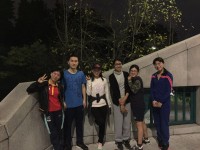 我感到非常荣幸能进入早稻田大学继续我博士课程的学习。早大为学生提供了非常丰富的研究资源,学校图书馆图书储存量居于日本大学图书馆前列,特别是储存有非常丰富的中国已经不存的古代汉籍。此外,早大的国际项目为留学生安排了专门的英语课程,不用担心语言成为学习的障碍。
我感到非常荣幸能进入早稻田大学继续我博士课程的学习。早大为学生提供了非常丰富的研究资源,学校图书馆图书储存量居于日本大学图书馆前列,特别是储存有非常丰富的中国已经不存的古代汉籍。此外,早大的国际项目为留学生安排了专门的英语课程,不用担心语言成为学习的障碍。
- Tags
- General Student Voices


